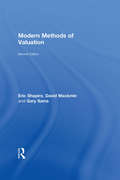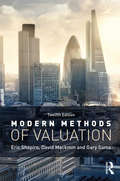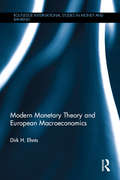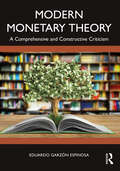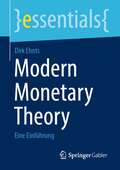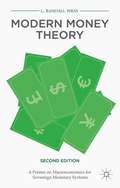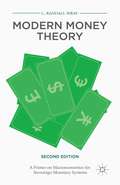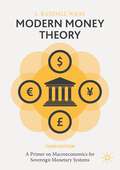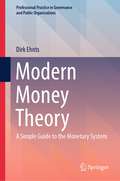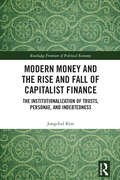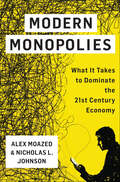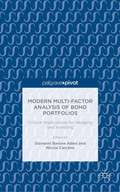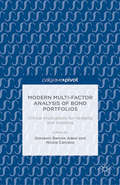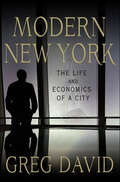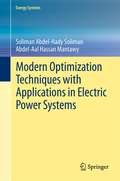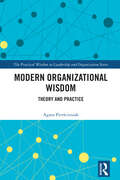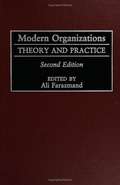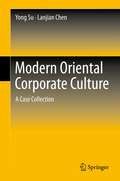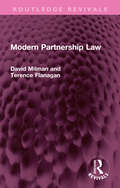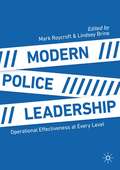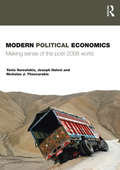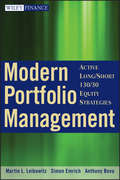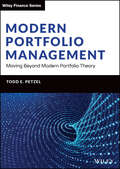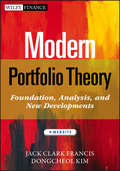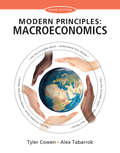- Table View
- List View
Modern Methods of Valuation
by David Mackmin Eric Shapiro Gary SamsThe new and improved eleventh edition of this essential valuation textbook reflects the changes in the property market since 2009, whilst presenting the tried and tested study of the principles governing the valuation of land, houses and buildings of the previous editions. The eleventh edition is fully up-to-date with latest guidelines, statutes and case law, including the implications of the latest RICS Red Book and the Localism Act. Its comprehensive coverage of the legal, economic and technical aspects of valuation make this book a core text for most University and College Real Estate Programmes and to provide trainees (APC Candidates) and practitioners with current and relevant guidance on the preparation of valuations for statutory purposes. Over the twenty eight chapters, the author team of experienced valuation experts present detailed accounts of the application of these principles to the everyday problems met in practice. This new edition continues to be of excellent value to both students and practitioners alike as it provides the reader with a clear understanding of the methods and techniques of valuation.
Modern Methods of Valuation
by David Mackmin Eric Shapiro Gary SamsModern Methods of Valuation covers real estate valuation theory and methods, UK valuation standards compliant with international standards and the application of these methods to the valuation of most types of property for most value purposes. Significant changes in this new edition include: New international Valuation Standards 2013 New RICS Valuation – Professional Standards 2014 Replacement of RICS code of Measuring Practice (6th edition) with RICS property measurement incorporating International Property Measurement standards 2015 Amendments to areas of statutory valuations; in particular those recently introduced specifically for HS2 and those set out in the Localism Act 2011 and The Housing and Planning Act 2016. Budget and regulatory changes affecting taxation and Business Rates Various new and revised RICS guidance notes and emerging areas relating to professional valuations such as International Professional and Ethical Standards, Sustainability and sustainable values. Modern Methods of Valuation is packed with practical examples and presents the most comprehensive study of the subject of Property Valuation available in the UK. It is an essential text for all three years of University and College degree programmes in Real Estate and related postgraduate conversion courses. It also supports RICS student members preparing for their Assessment of Professional Competence (APC).
Modern Monetary Theory and European Macroeconomics (Routledge International Studies in Money and Banking)
by Dirk H. EhntsThis book provides a new methodological approach to money and macroeconomics. Realizing that the abstract equilibrium models lacked descriptions of fundamental issues of a modern monetary economy, the focus of this book lies on the (stylized) balance sheets of the main actors. Money, after all, is born on the balance sheets of the central bank or commercial bank. While households and firms hold accounts at banks with deposits, banks hold an account at the central bank where deposits are called reserves. The book aims to explain how the two monetary circuits – central bank deposits and bank deposits – are intertwined. It is also shown how government spending injects money into the economy. Modern Monetary Theory and European Macroeconomics covers both the general case and then the Eurozone specifically. A very simple macroeconomic model follows which explains the major accounting identities of macroeconomics. Using this new methodology, the Eurozone crisis is examined from a fresh perspective. It turns out that not government debt but the stagnation of private sector debt was the major economic problem and that cuts in government spending worsened the economic situation. The concluding chapters discuss what a solution to the current problems of the Eurozone must look like, with scenarios that examine a future with and without a euro. This book provides a detailed balance sheet view of monetary and fiscal operations, with a focus on the Eurozone economy. Students, policy-makers and financial market actors will learn to assess the institutional processes that underpin a modern monetary economy, in times of boom and in times of bust.
Modern Monetary Theory: A Comprehensive and Constructive Criticism
by Eduardo Garzón EspinosaThis book offers a rigorous, detailed, and balanced analysis of the various contributions to the Modern Monetary Theory (MMT) debate, incorporating both the arguments of proponents and those who point to its limitations and obstacles. Modern Monetary Theory has soared in popularity, particularly in response to the Covid-19 pandemic and subsequent impacts on the economy which have led to deeper discussions about monetary and financial systems, fiscal and monetary policies, inflation, and employment. The main characteristic of Modern Monetary Theory is that it offers a revolutionary way of thinking about all these issues, allowing us to abandon many of the myths that conventional economic theory installed in the collective imagination. Breaking down these false beliefs is an essential requirement for thinking and devising economic policy proposals that allow full employment to be achieved without suffering worrying inflation rates. However, this approach has also attracted many criticisms and it is also instructive to consider these in more detail to reach a fully rounded conclusion about the potential or merits of MMT. Written to be accessible to the non-economist, this book will be of great interest to readers from across the social sciences, and outside of academia who want to gain a fuller understanding of the Modern Monetary Theory phenomenon.
Modern Monetary Theory: Eine Einführung (essentials)
by Dirk EhntsDieses essential erläutert, wie Zentralbanken, Banken und Regierungen Geld schöpfen. Bei modernem Geld handelt es sich letztlich um eine Steuergutschrift, die der Staat über seine Zentralbank als Monopolist ausgibt. Daher gibt es kein „Steuerzahler-Geld“ (Thatcher 1983) und „Staatsschulden“ sind lediglich Geld im Besitz der Bürger*innen, welches für spätere Steuerzahlungen verwendet werden kann. Preisstabilität, Vollbeschäftigung und nachhaltige Ressourcennutzung ergeben sich nicht von allein. Der Einsatz von Wirtschaftspolitik zur Erreichung dieser Ziele wird beschrieben.
Modern Money Theory: A Primer on Macroeconomics for Sovereign Monetary Systems
by L. Randall WrayModern Money Theory.
Modern Money Theory: A Primer on Macroeconomics for Sovereign Monetary Systems
by L. Randall WrayThis second edition explores how money 'works' in the modern economy and synthesises the key principles of Modern Money Theory, exploring macro accounting, currency regimes and exchange rates in both the USA and developing nations.
Modern Money Theory: A Primer on Macroeconomics for Sovereign Monetary Systems
by L. Randall WrayThis book, a revised new edition, examines how money is created and how it functions within global exchange rate regimes to highlight how monetary policy can promote economic growth, full employment, and price stability. It provides an introduction to the basics of macroeconomic accounting and the domestic monetary system, as well as fiscal operations, tax policy for sovereign nations, alternative exchange rate regimes. New topics, including central bank clearing, responses to the COVID-19 pandemic, the rise of inflation, and how to finance a Green New Deal, are also discussed. Modern Money Theory provides the reader with a framework for understanding real world economies. It will be relevant to students, researchers, and policymakers interested in monetary policy.
Modern Money Theory: A Simple Guide to the Monetary System (Professional Practice in Governance and Public Organizations)
by Dirk EhntsThis book explains how central banks, banks and governments create money. Written in an accessible style, this book provides an introduction to modern monetary theory without requiring any prior knowledge of economics. It covers the most important aspects of monetary theory, including inflation targeting, government spending, and international trade, as well as economic policy to achieve macroeconomic goals, such as price stability, full employment and sustainable use of resources. Accordingly, it offers a valuable asset for students of economics, central bankers, banking professionals, and academics alike.
Modern Money and the Rise and Fall of Capitalist Finance: The Institutionalization of Tusts, Personae and Indebtedness (Routledge Frontiers of Political Economy)
by Jongchul KimModern Money and the Rise and Fall of Capitalist Finance examines the true nature of modern money and seeks ideas for an alternative economic system for a just society. This book suggests that adopting the ideas and institutions of a trust allowed personae to be combined with creditor-debtor relations and, by doing so, led to the evolution of modern money. This also helps explain why modern banking arose in England rather than continental Europe, by conceptualizing modern money as a trust and investigating the inseparable relationship between personae and modern money, because it is more than creditor-debtor relations - it takes the form of a trust. In explaining how the capitalist credit-money economy differs from previous economies, this book is a significant contribution to the literature on modern money, heterodox economics and the philosophy of economics and finance.
Modern Monopolies: What It Takes to Dominate the 21st Century Economy
by Nicholas L. Johnson Alex MoazedIn Modern Monopolies, Alex Moazed and Nicholas L. Johnson tell the definitive story of what has changed, what it means for businesses today, and how managers, entrepreneurs, and business owners can adapt and thrive in this new era.What do Google, Snapchat, Tinder, Amazon, and Uber have in common, besides soaring market share? They're platforms - a new business model that has quietly become the only game in town, creating vast fortunes for its founders while dominating everyone's daily life. A platform, by definition, creates value by facilitating an exchange between two or more interdependent groups. So, rather that making things, they simply connect people.The Internet today is awash in platforms - Facebook is responsible for nearly 25 percent of total Web visits, and the Google platform crash in 2013 took about 40 percent of Internet traffic with it. Representing the ten most trafficked sites in the U.S., platforms are also prominent over the globe; in China, they hold the top eight spots in web traffic rankings.The advent of mobile computing and its ubiquitous connectivity have forever altered how we interact with each other, melding the digital and physical worlds and blurring distinctions between "offline" and "online." These platform giants are expanding their influence from the digital world to the whole economy. Yet, few people truly grasp the radical structural shifts of the last ten years.
Modern Multi-Factor Analysis of Bond Portfolios: Critical Implications for Hedging and Investing
by Giovanni Barone Adesi Nicola CarcanoModern Multi-Factor Analysis of Bond Portfolios.
Modern Multi-Factor Analysis of Bond Portfolios: Critical Implications for Hedging and Investing
by Giovanni Barone Adesi Nicola CarcanoWhere institutions and individuals averagely invest the majority of their assets in money-market and fixed-income instruments, interest rate risk management could be seen as the single most important global financial issue. However, the majority of the key techniques used by most investors were developed several decades ago, and the advantages of multi-factor models are not fully recognised by many researchers and practitioners.This book provides clear and practical insight into bond portfolios and portfolio management through key empirical analysis. The authors use extensive sets of empirical data to describe the value potentially added by more recent techniques to manage interest rate risk relative to traditional techniques and to present empirical evidence of such an added value. Beginning with a description of the simplest models and moving on to the most complex, the authors offer key recommendations for the future of rate risk management.
Modern New York: The Life and Economics of a City
by Greg DavidThe economic history of New York is filled with high-stakes drama and big figures. In Modern New York, renowned economist and political commentator Greg David tells the story of the metropolis's financial highs and lows since the 1960s. He takes a hard look at how Wall Street came to dominate the economy in the years following the wrenching decade of the Fiscal Crisis and how New York's high finance roller coaster came to affect the entire city and the world. He tackles the major controversies over real estate development, the growth of inequality, the role of immigration and the prospects for diversification. In addition Modern New York profiles the business and political leaders at the forefront of today's economic issues, as well as the average people who benefit from (and are the casualties of) the structure and cycles of this hub's capricious economy. From covert breakfasts with Wall Street heads to profiles of people like the brilliant but complex economic development artist Dan Doctoroff, Modern New York features all sorts of characters with big personalities and big wallets, from Donald Trump to Michael Bloomberg.This book takes readers on a journey to understanding the machinery and people as well as the spirit of New York. With its many great stories and applicability to other metropolises such as London, Singapore, Sydney, or Hong Kong, it will be relevant to readers around the world..
Modern Optimization Techniques with Applications in Electric Power Systems
by Abdel-Aal Hassan Mantawy Soliman Abdel-Hady SolimanThis book presents the application of some AI related optimization techniques in the operation and control of electric power systems. With practical applications and examples the use of functional analysis, simulated annealing, Tabu-search, Genetic algorithms and fuzzy systems for the optimization of power systems is discussed in detail. Preliminary mathematical concepts are presented before moving to more advanced material. Researchers and graduate students will benefit from this book. Engineers working in utility companies, operations and control, and resource management will also find this book useful.
Modern Organizational Wisdom: Theory and Practice (The Practical Wisdom in Leadership and Organization Series)
by Agata PierścieniakModern Organizational Wisdom: Theory and Practice presents a fresh perspective on knowledge management processes, exploring how employee expertise transforms into practical solutions for organizational challenges. This innovative concept, grounded in the scientific achievements of organizational learning and absorptive capacity, sheds new light on converting knowledge into action. The book introduces a procedure that links key knowledge management concepts, streamlining their understanding and simplifying their application. This approach makes complex phenomena more accessible and practical for professionals. In the theoretical section, the book outlines a straightforward model of Modern Organizational Wisdom (MOW), which consists of a knowledge-to-solution transformation process complemented by a set of organizational competencies essential to its success. Including these competencies as an integral component of MOW represents a groundbreaking approach to this subject. The practical section bridges theory with real-world applications, offering insights into how these phenomena manifest in business practice. Readers will discover the drivers that foster MOW and the obstacles that hinder its development. With its accessible language and innovative take on organizational wisdom, this book inspires researchers in knowledge and strategic management and is a valuable resource for practitioners. It helps leaders understand how their employees’ knowledge can fuel business growth and success.
Modern Organizations: Theory and Practice (2nd Edition)
by Ali Farazmand<p>Farazmand and his contributors examine modern organization theory and behavior. They view organization in two ways: As an organization of society into public, private, and nonprofit sectors, and they examine the power structure and those power elites who determine policy choices and outcomes. They also look at organizing activity, such as creating institutional arrangements to perform certain functions or tasks, as well as organizational entities of all sizes. <p>Using a balanced approach to analyze modern organizations' managerial expectations and individual/citizen expectations and demands, the book presents a succinct analysis of theoretical and conceptual perspectives on modern organizations, their management, and their interactions with other organizations in an environment that is becoming increasingly global and integrated worldwide. Although all organizations are covered, the emphasis is placed mainly on public organizations. The book also addresses key issues of organizational change, reform, and reorganization of governments in both theoretical and empirical ways. A key text and handbook for scholars, students, researchers, and practitioners of public administration and the management of nonprofit organizations.
Modern Oriental Corporate Culture
by Yong Su Lanjian ChenThe book covers Oriental management theories as well as their applications; research on positivism; long-term focus; exclusive interviews and accumulating first-hand data, etc. It also addresses the following topics: Chinese family businesses that have survived for more than one hundred years(e. g. INFINITUS, Beijing TRT); Chinese enterprises and firms that follow the oriental management culture serve as the dynamic engines to the 2nd largest economic entity in the world (e. g. , Huawei Technologies Co. , Ltd. , Mengniu Dairy Gr. , Hainan Airlines and so on); Eastern and western managerial cultures that have been growing within Chinese businesses(e. g. , Hainan Airlines, INFINITUS); Varied schools such as Confucianism, Taoism, Buddhism, legalism, Military Strategists, Mohist School remain vital but at the same time Chinese businesses and firms welcome and extract the essence of western managerial civilization rather than reject it, etc. These areas will be of particular interest to readers, and the purpose of the book is not only to acquaint the reader with China by providing information about Chinese businesses and firms, but also to provide a royal road to doing business with China as well as allowing them to learn about Chinese managerial wisdom.
Modern Partnership Law (Routledge Revivals)
by David Milman Terence FlanaganFirst published in 1983, Modern Partnership Law departs from the traditionally stale treatment of the subject. The amount of effort being made to encourage small businesses has made partnership law particularly relevant. This book contains chapters on partnership finance; employees; partnerships between spouses and legal intervention in partnership law. In an attempt to move away from citing hackneyed nineteenth century English authorities on this subject, greater prominence is given to Commonwealth cases. This book should be a stimulating addition to the list of all law students.
Modern Police Leadership: Operational Effectiveness at Every Level
by Mark Roycroft Lindsey BrineThis edited textbook covers a range of key operational and strategic aspects of police administration, from experts who have both an academic and practitioner background. It sets out the modern challenges and demands facing the police and then covers the theory and practice of how to deal with such issues, including the leadership skills which are required at every level. These challenges are covered in sections on the use of force, international policing, investigation of new crimes and forensic investigation, counter-terrorism, intelligence, mental well-being, and community policing. Some of the key themes discussed include dealing with public demand for police services, diversity and partnership/interoperability working locally, regionally and internationally. This book is designed at all levels of warranted officer and speaks to undergraduate and postgraduate policing students with a range of pedagogic features including seminar and exam questions.
Modern Political Economics: Making Sense of the Post-2008 World
by Yanis Varoufakis Joseph Halevi Nicholas TheocarakisOnce in a while the world astonishes itself. Anxious incredulity replaces intellectual torpor and a puzzled public strains its antennae in every possible direction, desperately seeking explanations for the causes and nature of what just hit it. 2008 was such a moment. Not only did the financial system collapse, and send the real economy into a tailspin, but it also revealed the great gulf separating economics from a very real capitalism. Modern Political Economics has a single aim: To help readers make sense of how 2008 came about and what the post-2008 world has in store. The book is divided into two parts. The first part delves into every major economic theory, from Aristotle to the present, with a determination to discover clues of what went wrong in 2008. The main finding is that all economic theory is inherently flawed. Any system of ideas whose purpose is to describe capitalism in mathematical or engineering terms leads to inevitable logical inconsistency; an inherent error that stands between us and a decent grasp of capitalist reality. The only scientific truth about capitalism is its radical indeterminacy, a condition which makes it impossible to use science's tools (e.g. calculus and statistics) to second-guess it. The second part casts an attentive eye on the post-war era; on the breeding ground of the Crash of 2008. It distinguishes between two major post-war phases: The Global Plan (1947-1971) and the Global Minotaur (1971-2008). This dynamic new book delves into every major economic theory and maps out meticulously the trajectory that global capitalism followed from post-war almost centrally planned stability, to designed disintegration in the 1970s, to an intentional magnification of unsustainable imbalances in the 1980s and, finally, to the most spectacular privatisation of money in the 1990s and beyond. Modern Political Economics is essential reading for Economics students and anyone seeking a better understanding of the 2008 economic crash.
Modern Portfolio Management
by Martin L. Leibowitz Anthony Bova Simon EmrichActive 130/30 Extensions is the newest wave of disciplined investment strategies that involves asymmetric decision-making on long/short portfolio decisions, concentrated investment risk-taking in contrast to diversification, systematic portfolio risk management, and flexibility in portfolio design. This strategy is the building block for a number of 130/30 and 120/20 investment strategies offered to institutional and sophisticated high net worth individual investors who want to manage their portfolios actively and aggressively to outperform the market.
Modern Portfolio Management: Moving Beyond Modern Portfolio Theory
by Todd E. PetzelGet a practical and thoroughly updated look at investment and portfolio management from an accomplished veteran of the discipline In Modern Portfolio Management: Moving Beyond Modern Portfolio Theory, investment executive and advisor Dr. Todd E. Petzel delivers a grounded and insightful exploration of developments in finance since the advent of Modern Portfolio Theory. You’ll find the tools and concepts you need to evaluate new products and portfolios and identify practical issues in areas like operations, decision-making, and regulation. In this book, you’ll also: Discover why Modern Portfolio Theory is at odds with developments in the field of Behavioral Finance Examine the never-ending argument between passive and active management and learn to set long-term goals and objectives Find investor perspectives on perennial issues like corporate governance, manager turnover, fraud risks, and ESG investing Perfect for institutional and individual investors, investment committee members, and fiduciaries responsible for portfolio construction and oversight, Modern Portfolio Management is also a must-read for fund and portfolio managers who seek to better understand their investors.
Modern Portfolio Theory
by Dongcheol Kim Jack Clark FrancisA through guide covering Modern Portfolio Theory as well as the recent developments surrounding itModern portfolio theory (MPT), which originated with Harry Markowitz's seminal paper "Portfolio Selection" in 1952, has stood the test of time and continues to be the intellectual foundation for real-world portfolio management. This book presents a comprehensive picture of MPT in a manner that can be effectively used by financial practitioners and understood by students.Modern Portfolio Theory provides a summary of the important findings from all of the financial research done since MPT was created and presents all the MPT formulas and models using one consistent set of mathematical symbols. Opening with an informative introduction to the concepts of probability and utility theory, it quickly moves on to discuss Markowitz's seminal work on the topic with a thorough explanation of the underlying mathematics.Analyzes portfolios of all sizes and types, shows how the advanced findings and formulas are derived, and offers a concise and comprehensive review of MPT literatureAddresses logical extensions to Markowitz's work, including the Capital Asset Pricing Model, Arbitrage Pricing Theory, portfolio ranking models, and performance attributionConsiders stock market developments like decimalization, high frequency trading, and algorithmic trading, and reveals how they align with MPTCompanion Website contains Excel spreadsheets that allow you to compute and graph Markowitz efficient frontiers with riskless and risky assetsIf you want to gain a complete understanding of modern portfolio theory this is the book you need to read.
Modern Principles
by Tyler Cowen Alex TabarrokEngaging and provocative writing, as well as a knack for revealing the "invisible hand" of economics at work have made Cowen and Tabarrok's Modern Principles of Economics a singularly distinctive and effective textbook for the principles course. The thoroughly updated new edition of Modern Principles again draws on a wealth of captivating applications to show readers how economics shed light on business, politics, world affairs, and everyday life just as the authors do in their wildly successful blog, marginalrevolution. com.
